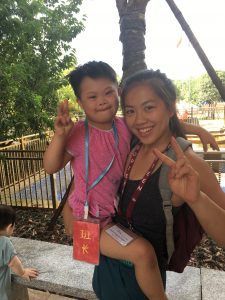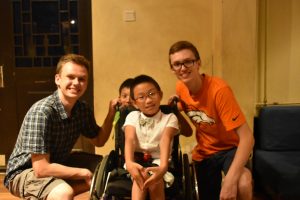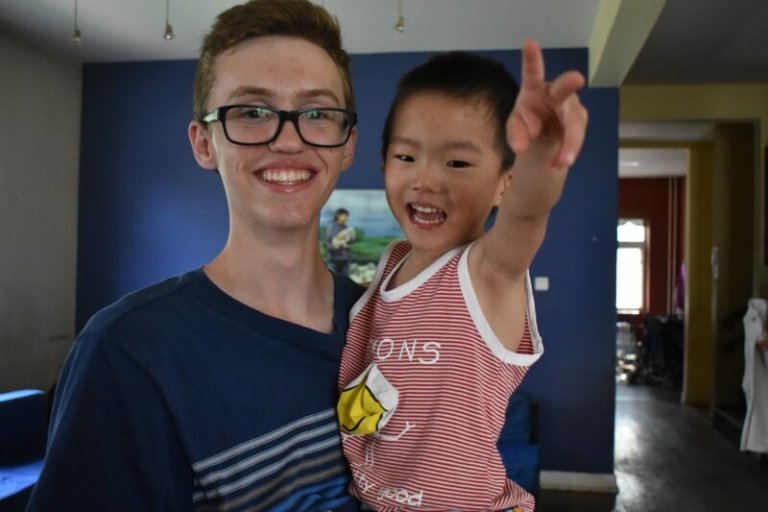“All three students are very motivated to learn Chinese,” says Colorado Academy Upper School Mandarin Chinese teacher Julie Wei. Brothers Eric and Evan Rumsfeld worked in the Hebei Province, and Junior Alena Holbert volunteered at an orphanage in Hunan Province. Eric and Alena spent their summer break after freshman year doing independent study and were able to skip CA’s Chinese 2 course. Their teacher says both of them will be in AP Chinese next year.
The Rumsfeld brothers were so taken by their experience, they say they plan to return to volunteer again next summer, and this time, they will take their younger sister, Natalie.
For Alena, the work was already a return trip of sorts. Hunan is the place from which she was originally adopted. Here are the students’ travel memoirs:
ALENA HOLBERT
 “In 2000, I was left at a train station. Due to the “one-child policy” in China and overwhelming preference for boys, I, along with thousands of girls, found myself at an orphanage. While I don’t know anything about my birth family, and though I have a thousand questions, I trust that they love me because they left me to be found. They wanted a good life for me, and that’s what I got. Through CCAI, an adoption agency, I was adopted from ChenZhou, Hunan, which is about 253 miles north of Hong Kong and 140 miles south of the ZhuZhou City Children’s Social Welfare Institute. This past summer, I returned to China with 23 other adoptees to volunteer through a program called Adopteen.
“In 2000, I was left at a train station. Due to the “one-child policy” in China and overwhelming preference for boys, I, along with thousands of girls, found myself at an orphanage. While I don’t know anything about my birth family, and though I have a thousand questions, I trust that they love me because they left me to be found. They wanted a good life for me, and that’s what I got. Through CCAI, an adoption agency, I was adopted from ChenZhou, Hunan, which is about 253 miles north of Hong Kong and 140 miles south of the ZhuZhou City Children’s Social Welfare Institute. This past summer, I returned to China with 23 other adoptees to volunteer through a program called Adopteen.
The one-child policy ended at the beginning of 2016, dramatically affecting the population of Chinese orphanages. The stigma in China around disabilities is high to say the least, as evident by the fact that many places are not handicap accessible. These days, over 90% of the children in orphanages suffer from a physical or mental handicap. Traveling back to an orphanage, this is what I expected to see. What I didn’t expect, though, was how much the children wanted to give and receive love.
We pulled up to the front of the orphanage in a bus not knowing what to expect. There were some kids outside waiting for us, and they were watching and giggling the entire time as the director gave us a tour of the facility. The campus was beautifully open, green, and inviting, complete with colorful classrooms, rehab equipment, a cafeteria, a playground, and even foster homes which are a unique part of this orphanage. Many of the children would live in a home with up to five other kids, and they would eat, play, and attend classes during the day. They rarely, if ever, get to go off campus. So, the first day, we took them to go watch Despicable Me 3 in a theater.
For most, this was their first time seeing the world beyond the orphanage, and it was incredible to watch their eyes light up with excitement, curiosity, and appreciation for simply going on a bus and watching a movie, something most of us take for granted. Meanwhile, we were having a hard time communicating with the children.
Before leaving, we met the roughly 30 children who were able to go (many didn’t come because they were too young, would have a difficult time getting around, or were unable to leave their beds) and paired up with them. I walked up to a girl named XiaManQing who was 10 years old. She was extremely patient when I tried talking to her in my limited Chinese, and I learned that she loves getting her picture taken, she loves having her own things, she loves hugs, she gets cranky when she’s tired, and, though she can walk perfectly, she likes people to carry her. She also has Down Syndrome. I also discovered that what she, along with the nearly 300 other children at the orphanage, want, though, is love, and in return they have so much to give back.
They act like kids, they talk like kids, and they love like kids, because that’s who they are. From the moment they got on the bus, they were ecstatic. For most, this was their first time seeing the world beyond the orphanage, and it was incredible to watch their eyes light up with excitement, curiosity, and appreciation for simply going on a bus and watching a movie, something most of us take for granted. Meanwhile, we were having a hard time communicating with the children.
ZhuZhou is not very westernized, therefore rarely anyone knew English. Looking back on it now, I realized I was telling ManQing to stand, but she knew that I meant sit, and we bonded over hugs and my relatively poor Chinese.
I’m so lucky to have been adopted into such an amazing family that provides me with a limitless amount of opportunity, including this one that allowed me to give back to such an important part of my life. As a healthy and happy baby, the odds were stacked in my favor, but this element of chance means not every child finds their forever family. It was equally inspiring and heartbreaking to be back in an orphanage and to see where my life could have been. It was a wake-up call for me to recognize the opportunities that I’ve been blessed with. While the orphanage is providing well, and the nannies, directors, teachers, and foster parents are doing a marvelous job with their unflagging devotion and compassion, children thrive on the love and attention only a family can give.
The last moments at the orphanage were bittersweet. After making dumplings, visiting a museum, tie-dying shirts, doing crafts, singing, dancing, playing outside, and even celebrating some birthdays, we had to say our goodbyes. We cried, then they cried, then we cried some more.
We were leaving to return to our happy homes and wonderful families, but they were staying in ZhuZhou. Perhaps we gave them hope, hope that there is a family waiting for them, hope that there’s an entire world for them to explore, hope that they will find the life they’ve always dreamed of. What I am sure of, though, is that we loved them with every ounce of our being, and they loved us back even more.
EVAN RUMSFELD
 This summer my brother, Eric Rumsfeld, and I travelled to the Beijing and Tianjin municipalities in northeastern China. During the first couple of days of our trip, we toured around Beijing with our dad and bought food and groceries so my brother and I would be able to live independently in Tianjin, China 6,350 miles away from home.
This summer my brother, Eric Rumsfeld, and I travelled to the Beijing and Tianjin municipalities in northeastern China. During the first couple of days of our trip, we toured around Beijing with our dad and bought food and groceries so my brother and I would be able to live independently in Tianjin, China 6,350 miles away from home.
We quickly became accustomed to the time difference, food, and language. Although some people are able to speak English with varying degrees of fluency in Beijing, as we moved farther away from the capital and into a more rural setting, it became more rare to be able to talk to someone without having to use Chinese. There was a further level of complexity in communication when trying to speak with people who have a specific accent or dialect, such as our driver taking us to the Great Wall.
Despite these complications, I could tell my pronunciation and overall fluency in the language improved a little each day. After our dad left, we lived in an orphanage in Tianjin to help the more than 60 children living there in any way we could. Shepherd’s Field Children’s Orphanage provides shelter, clean water, food, education, and medical assistance to special needs children who have been taken in from other orphanages across China.
A favorite memory was pushing Maya around in a stroller; Maya has cerebral palsy. We walked around campus every day. We developed an unspoken bond connected by this daily walk
As interns, we had specific daily jobs that assisted in taking care of the children living there. My task was to play with, and give attention to the children that couldn’t attend the on-campus school. These kids were either too young to go to school, or had some sort of condition that would prevent them from attending. Often times, these kids are more neglected and left to their own devices throughout the day.
My daily routine consisted of spending an hour at each of the five on campus houses to play with the children. It was great to visually affirm that I was making an impact there when I would see the kids’ faces light up every day as I walked into each house with our box of toys. Including the kids that were too young to go to school, the kids I interacted with daily had cerebral palsy, muscular dystrophy, mental delay, and other forms of developmental delay. I quickly learned that although these conditions play a major role in these kids’ lives, it is their personality and character that better defines who they are. A favorite memory was pushing Maya around in a stroller; Maya has cerebral palsy. We walked around campus every day. We developed an unspoken bond connected by this daily walk
that gave her the basic experience of enjoying outdoors. Without those walks, it is unlikely that she would ever go outside. During my sojourn in Tianjin, I experienced first-hand what it means to make a positive impact on someone else’s life.
In a world where these children would otherwise be neglected, their need for attention and love leading to self-validation is ultimately the reason why it is important to support places like Shepherd’s Field. Although these children are often defined by their disabilities and differences, I have learned through their laughter, playfulness, and friendship the extent of their fantastic personalities. The memories and friendships from this trip are something that I hold dear and will always remember.
